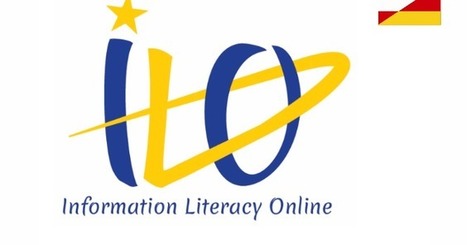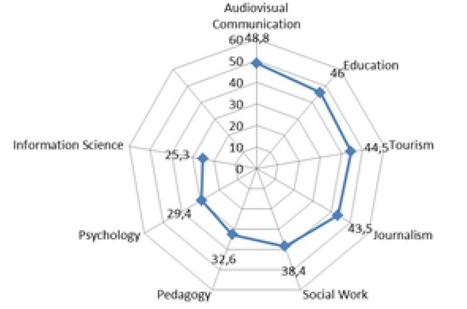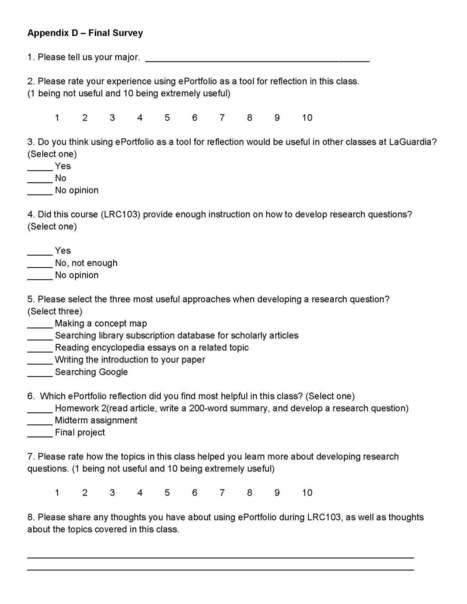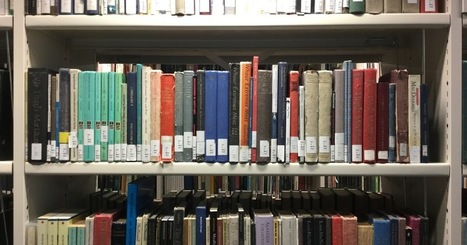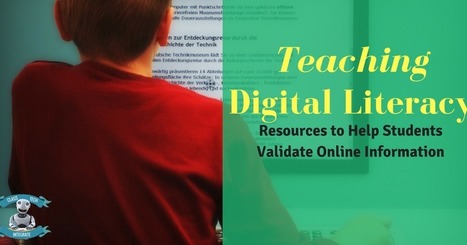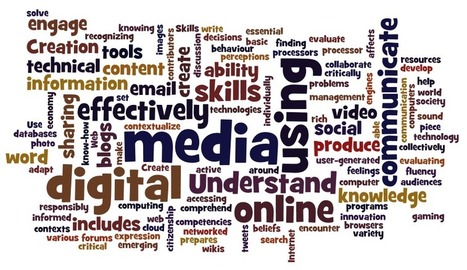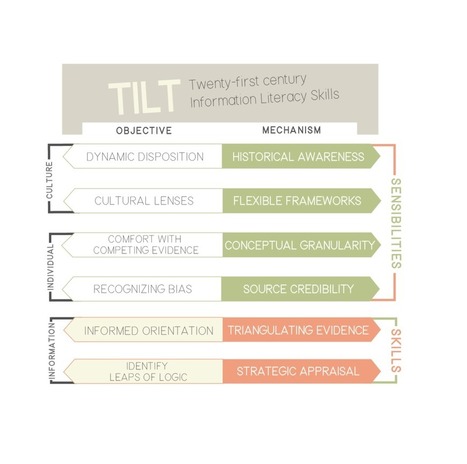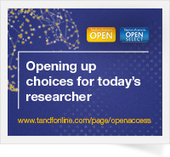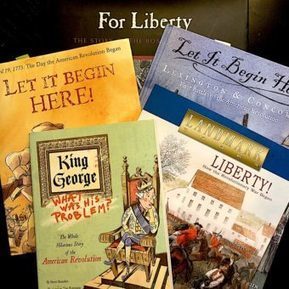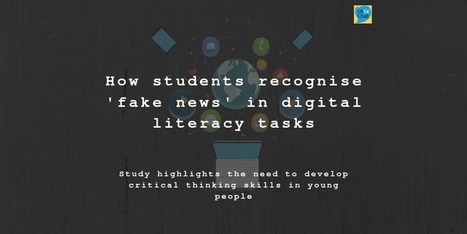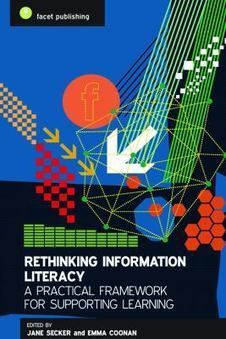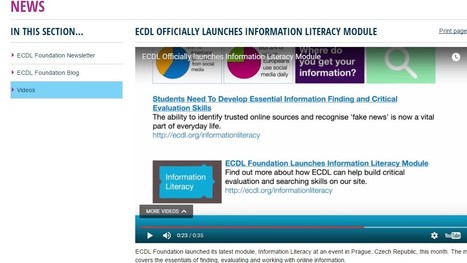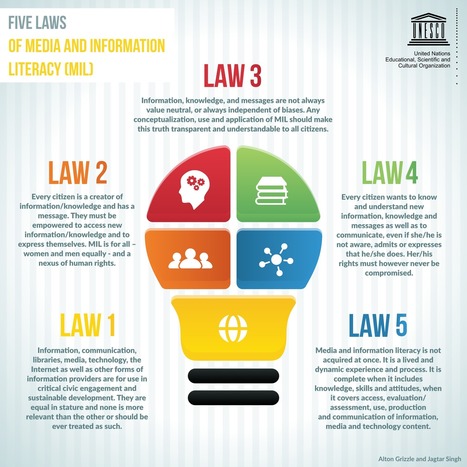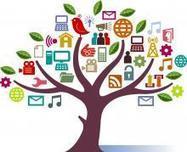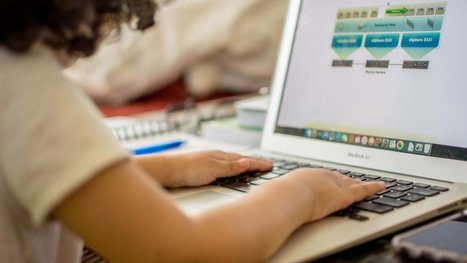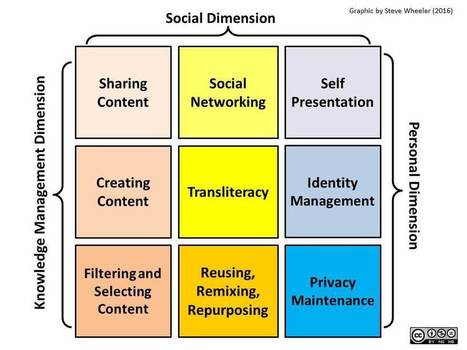 Your new post is loading...
 Your new post is loading...
In our 24/7, always-connected world where we are inundated with information from all sides, the ability to identify quality resources to inform our research and actions has become a major focus in higher education. Digital Content Curation, as it is called, is something that many faculty believe they should be teaching their students, but they are not sure where to start. I have created a model of Digital Content Curation that faculty can use to help students sharpen their digital literacy and research skills (Garner, in press).
Via Elizabeth E Charles
The MOOC: Information Literacy Online has been released. The MOOC is available in: English, German, Catalan, Spanish, Croatian and Slovenian. There are six main modules:
Module 1: Orienting in an information landscape
Module 2: Research is a journey of inquiries
Module 3: The power of search
Module 4: Critical information appraisal
Module 5: Information use: the right and fair way
Module 6: Let’s create something new based on information and share it!
Additionally there are a couple subject-specific modules (in the English-language version, but only one in the German and Croatian versions and none in the Spanish). There is text and pictures, plus some videos and quizzes.
This is the outcome of a European project (articles etc. about the project here - this article gives an interesting and detailed account of the guiding principles and practicalities).
The content can also be re-used under a Creative Commons license.
Go to https://informationliteracy.eu/en
Via Elizabeth E Charles
Preference for autonomous versus directed learning for the acquisition of information competencies (ICs) was analyzed among undergraduate social science students according to gender, degree program, belief in importance, and self-efficacy. Data were gathered using the IL-HUMASS (Information Literacy Humanities Social Sciences) online survey from students at five public Spanish universities enrolled in audiovisual communication, education, information science, pedagogy, journalism, psychology, social work, and tourism undergraduate programs during the 2013–2014 academic year. Mann-Whitney U, Kruskal-Wallis, and chi-square tests, as well as discriminant analysis, were performed. The results revealed a higher preference for the directed learning style in the four IL competency categories: searching, evaluation, processing, and communication-dissemination. Audiovisual communication, education, and journalism students showed a predilection for autonomous learning, whereas information science and psychology students preferred directed learning. Higher scores in belief in importance correlated with a greater preference for autonomous learning. In contrast, higher levels of self-efficacy were associated with a greater preference for directed learning.
Via Elizabeth E Charles
The following case study investigated the efficacy of Information Literacy (IL) pedagogy on undergraduate research in a credit-bearing library instruction class. More specifically, the study analyzed student success and sought to determine whether written reflection and practice strengthen IL skills, including the fundamental ability to develop a research question and thesis statement. Developing research questions and formulating thesis statements are among the most challenging duties of a young researcher. From high school through undergraduate, students often have minimal experience conducting research. They may not know where to begin the research process and what steps are necessary. Student frustration is exacerbated by the fact that typically IL instruction is one-shot guidance, given only once in a semester, making it difficult for a librarian to cover all that is needed. Can a semester long, credit-bearing course aid student success in research and improve IL skills? The instructors introduced several techniques to improve IL skills, and instructors evaluated three class assignments based on their college’s core competencies. Additionally, instructors collected and analyzed students’ written reflections of their progress and an end of semester survey as both qualitative and quantitative data.
Via Elizabeth E Charles
The next session I attended at the i3 conference was Edward Luca (an academic librarian at the University of Sydney) on Truly embedded librarianship: rethinking information literacy through understanding disciplinary information practices in higher education.
Starting as a subject librarian in pharmacy, his question to the literature was "how can we embed information literacy within a disciplinary context". The conclusions seemed to be that information literacy was genrally left to librarians, and that is was dominated by one-shot sessions, which may not be contextualised. He noted that the solution to this was often aiming to tie the IL education to student needs for assignments. However, there did appear to be a lack of real collaboration between librarian and faculty.
The value of "embedded" librarianship was seen as it being user-oriented, with closer collaboration, with sometimes even physical embedding within a department. Luca moved on to look at varying information practices within disciplines, and relating information literacy to that.
Via Elizabeth E Charles
“Information literacy empowers people in all walks of life to seek, evaluate, use and create information effectively to achieve their personal, social, occupational and educational goals. It is a basic human right in a digital world and promotes social inclusion in all nations.” UNESCO (2005) Alexandria Proclamation
This new 4th edition of Cardiff University’s Handbook for Information Literacy Teaching (HILT) embraces the concept that information literacy (IL) forms a component of a wider portfolio of learning literacies which should ideally be regarded holistically when designing curricula for our students.
Information literacy frameworks (such as A New Curriculum for Information Literacy and the new Association of College and Research Libraries Framework for Information Literacy for Higher Education, as well as the Digidol Framework for Learning Literacies) are advocating more flexible, meta-literate approaches which promote collaboration with academics to combine expertise in delivering teaching that encompasses various learning literacies to deliver the greatest benefit to students.“Information literacy empowers people in all walks of life to seek, evaluate, use and create information effectively to achieve their personal, social, occupational and educational goals. It is a b…
Via Elizabeth E Charles
A blog out integrating technology in the classroom. This includes tips for 1:1 classrooms, blended learning, flipped classrooms, and more.
Digital Literacy is a term that is growing ever more popular among those teaching our 21st Century Learners. Also known as Information Literacy, Digital Literacy is an important component of what is known as Digital Citizenship. It is a skill that many children and adults grapple with. One of my favorite memes on the topic is right here!
Via Elizabeth E Charles
This text is a remixed version, derived from SUNY's "The Information Literacy User’s Guide: An Open, Online Textbook". The text has been tailored to reflect the educational objectives of The College of New Rochelle and its School of New Resources. Feel free to remix and adapt in accordance with the CC-BY-NC-SA 3.0 license.
Via Elizabeth E Charles
Digital literacy is like any other core curricular subject. It is no longer an option, just as reading and math are not. Students must be digitally competent if they are to be successful in school and in their professional and personal lives as adults. Indeed, 3 out of 4 of the best jobs for many years to come will involve digital expertise.
Via Elizabeth E Charles
Information Literacy started out as library skills. How do we update these essential tools to help us navigate the digital age?
Via Elizabeth E Charles
Author(s): Trudi Jacobson, Greg Bobish, Deborah Bernnard, Daryl Bullis, Jenna Hecker, Irina Holden, Allison Hosier and Tor Loney
Good researchers have a host of tools at their disposal that make navigating today’s complex information ecosystem much more manageable. Gaining the knowledge, abilities, and self-reflection necessary to be a good researcher helps not only in academic settings, but is invaluable in any career, and throughout one’s life. The Information Literacy User’s Guide will start you on this route to success. The Information Literacy User’s Guide is based on two current models in information literacy: The 2011 version of The Seven Pillars Model, developed by the Society of College, National and University Libraries in the United Kingdom and the conception of information literacy as a metaliteracy, a model developed by one of this book’s authors in conjunction with Thomas Mackey, Dean of the Center for Distance Learning at SUNY Empire State College. These core foundations ensure that the material will be relevant to today’s students.
Via Elizabeth E Charles
(2013). Information Literacy for Health Professionals: Teaching Essential Information Skills with the Big6 Information Literacy Model. Community & Junior College Libraries: Vol. 19, No. 3-4, pp. 77-91. doi: 10.1080/02763915.2014.953435 Health professionals frequently do not possess the necessary information-seeking abilities to conduct an effective search in databases and Internet sources. Reference librarians may teach health professionals these information and technology skills through the Big6 information literacy model (Big6). This article aims to address this issue. It also exposes the possibilities of applying the Big6 model in health sciences libraries and other informational contexts, based on several instances of successful integration of this model into information literacy programs in health sciences environments as well as several instances of using the model for solving diverse information problems within this context. This model promises to be practical for reference librarians and information professionals who are interested in a different approach to instructional and information literacy work in health sciences libraries, thus the paper suggests to take a closer look at Big6.
Via Elizabeth E Charles
Theo Bothma presented Reflecting on Diverse Teaching Methodologies for an Information Literacy Programme for Large Groups (coauthored with Ann-Louise de Boer) at the European Conference on Information Literacy 2015 in Tallinn.
Via Elizabeth E Charles
|
When your students read, view, and listen to multiple sources on a topic or issue, do they tackle each source in a silo? Learning a little bit about this and a little bit about that but not really synthesizing the information from multiple sources?
Via Elizabeth E Charles
A recent study revealed students at an international school in Finland significantly outperformed U.S. students on tasks which measure digital literacy in social media and online news. The researchers suggest this may be due to the Finnish and International Baccalaureate curricula’s different way of facilitating students’ critical thinking skills compared to the US system and curriculum. The results of this study were published in the Journal of Research in International Education in April.
Via Elizabeth E Charles
The Internet is a swelling ocean of information, and navigating through its steady flow can often be challenging. This is certainly true for a student who is not information fluent, so what are some smart online research strategies? Luckily this question falls within the realm of Information Fluency, which involves the 5As process: - Asking the right questions
- Acquiring the knowledge
- Analyzing the content for relevancy and credibility
- Applying the knowledge to our use
- Assessing the effectiveness of our message
Via Elizabeth E Charles
ECDL Foundation launched its latest module, Information Literacy at an event in Prague, Czech Republic, this month. The module covers the essentials of finding, evaluating and working with online information.
Via Elizabeth E Charles
UNESCO has launched the Five Laws of Media and Information Literacy (MIL). The graph is in five languages (English, French, Spanish, Chinese, Portuguese). The graphs are also available on the UNESCO MIL website.
The Arabic and Russian versions are coming soon.
Via Elizabeth E Charles
What is digital and information literacy?
"Digital literacy defines those capabilities which fit an individual for living, learning and working in a digital society." JISC
In the context of OU study, digital literacy refers to the skills and capabilities of OU students using digital technologies to achieve personal, study and work-related goals.
Via Elizabeth E Charles
Studies suggest that many U.S. students are too trusting of information found on the internet and rarely evaluate the credibility of a website’s information. For example, a survey found that only 4 percent of middle school students reported checking the accuracy of information found on the web at school, and even fewer did so at home (New Literacies Research Team & Internet Reading Research Group, 2006). At the same time, the web is often used as a source of information in school projects, even in early schooling, and sites with inaccurate information can come up high in search rankings.
Via Elizabeth E Charles
What does digital literacy mean in 2016? I'm currently working with the New Media Consortium (NMC) on a research project (supported by Adobe) aimed at answering that question, and you can play a part. We're surveying people to see what they currently think is in digital literacy: technical skills, human skills, policies, platforms, and definitions.…
Via Elizabeth E Charles
Another free e-book arising from an information literacy class: Alison Hicks has edited a volume of essays from her class of library students (at the University of Denver), to form an engaging book aimed at librarians teaching information literacy. Hicks, A. (Ed.) (2016). Got a minute? Instruction tune-up for time pressed librarians. Pressbooks. http://gotaminute.pressbooks.com/
Via Elizabeth E Charles
Teaching research competencies and information literacy is an integral part of the academic librarian’s role. There has long been debate among librarians over what are the most effective methods of instruction for college students. Library Faculty at a large urban University System were surveyed to determine their perceptions of the effectiveness of common information literacy instruction techniques. The system includes both two-year and four-year programs, as well as degree granting institutions. This research was undertaken for the purpose of better prioritizing institutional teaching activities in the current academic climate. The research shows that librarians within the University System believed that instructional models which give librarians more time with students, particularly highly-engaged students, are the most effective.
Via Elizabeth E Charles
What is Information Literacy? “Information literacy forms the basis for lifelong learning. It is common to all disciplines, to all learning environments, and to all levels of education. It enables learners to master content and extend their investigations, become more self-directed, and assume greater control over their own learning.”(1) The Presidential Committee on Information Literacy defined information literacy as a set of skills, which require an individual to: “recognize when information is needed and have the ability to locate, evaluate, and use effectively the needed information.”(2) In January of 2000, the Information Literacy Competency Standards for Higher Education were approved and in February of 2004, the American Association for Higher Education and the Council of Independent Colleges endorsed them.(3) The Standards dictate that an information literate person:
Via Elizabeth E Charles
|



 Your new post is loading...
Your new post is loading...



